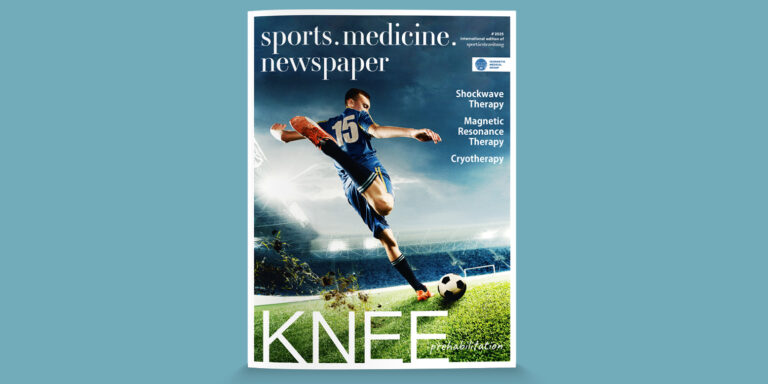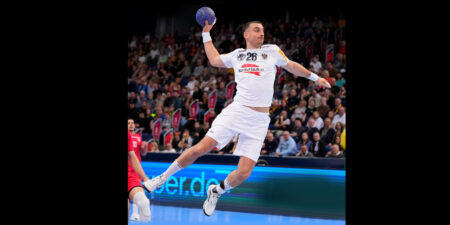When do regenerative therapies and sports medicine treatments begin? Not with the injection or the first shockwave, but with a coordinated, optimal physical, psychological and socio-medical preparation for medical interventions.
Particularly in the case of conservative regenerative procedures, especially with blood derivatives as orthobiologic therapy (PRP/ACP/ACS/BCS), also USGET Electrolysis, shock wave and viscosupplementation such as hyaluronic acid, targeted prehabilitation is of growing importance and can develop into a biological booster in the future, among other things through specific nutritional interventions and in combination with specific exercise ‘immunology’. ‘Prepare your patient – and their biology.’ (see Frank / Kim / Nüssler / Jacon. Outcome of cancer surgery. Deutsches Ärzteblatt 37/2022). This precise and probably also synergistic connection will be part of the future of these regenerative therapies. Success with PRP does not happen in a vacuum – nutrition, metabolism, exercise, and the inflammatory situation must be understood and specifically targeted as a complex interaction.
At this point, we would like to briefly and concisely present three papers that have addressed this topic and show the potential that lies behind them. More on this will be available in the coming months in the sportärztezeitung, www.sportaerztezeitung.comas well as on our youtube-health-channel. You can also find out more at the Isokinetic Conference in Madrid at the lessons and workshops by Tobias Würfel, MD and Alberto Schek, MD.
1. Recovery and the immune system (Haunhorst et al.)
Physical activity leads to functional changes in the immune system, in particular through an acute shift in circulating immune cells (Psczolla et al., 2017). For example, NK cell cytotoxicity increases in a load-dependent manner, mainly due to an increased number of cytotoxic cells in the blood (Campbell & Turner, 2018b; Walsh et al., 2011). At the same time, there is a transient release of pro- (e.g. IL 1β, IL 6, TNF α) and anti-inflammatory cytokines (e.g. IL 1ra, IL 10) (Moldoveanu et al., 2000; Ulven et al., 2015). IL-6 in particular increases – depending on training intensity and muscle mass – sometimes by a factor of 100 (Pedersen & Fischer, 2007; Steensberg et al., 2002). Despite its classic role as a pro-inflammatory marker, IL-6 has also an anti-inflammatory effect in the context of exercise, as it is released myogenically and inhibits TNF-α release (Starkie et al., 2003).
2. Nutrition and PRP composition (Platzer et al.)
A comparable immunomodulatory influence is also shown by eating behaviour. This paper analyses the variability of PRP and identifies clinical factors that could influence the therapeutically important components. The results show that the concentrations of interleukin-6 (IL-6) in PRP from vegans are significantly lower than in omnivores, while the concentrations of IGF-1 and platelets show no significant differences. Furthermore, no influence of the time of blood collection on the analysed parameters was detected. These findings are important for generating sufficient evidence for the therapeutic use of PRP in orthopaedics and suggest that dietary behaviour plays a significant role in PRP composition. Diet is thus a potentially relevant variable for the composition of immunoactive blood products.
https://link.springer.com/article/10.1007/s00132-023-04442-x
3. Optimisation of orthobiologic therapies through exercise, nutrition and dietary supplements (Montagnino et al.)
Lifestyle factors and their modification, such as exercise, nutrition and certain supplements, have been shown to influence the quality of autologous blood products such as PRP and cell-based therapies. Intensive physical activity not only increases the platelet count, but also improves their adhesion and the release of regenerative growth factors. At the same time, low-inflammatory diets can increase platelet activity, while stress, high sugar consumption or hypercholesterolaemia promote inflammatory processes and negatively affect the quality of PRP. The function of mesenchymal stromal cells (MSC), for example with regard to senescence, replication and differentiation, also reacts sensitively to exercise, calorie restriction and micronutrients. The authors emphasise the biological plausibility of these relationships, call for further translational studies to quantify the effect and for a stronger integration of these findings into individualised therapeutic approaches.
https://doi.org/10.1002/pmrj.13320
Autoren
» Facharzt für Orthopädie und Unfallchirurgie, Zusatzbezeichnung Spezielle orthopädische Chirurgie, Sportmedizin, Manuelle Medizin sowie Sportosteopathie DO.
» Chefarzt der Paracelsus Sportmedizin & Prävention Bremen im Weserstadion
» offizieller Medical Partner des SV Werder Bremen und
Mannschaftsarzt Fischtown Pinguins Eishockey Bremerhaven
ist Diplom-Sportwissenschaftler mit Professional Master’s Degree in Sports Medicine sowie postgradualen Weiterbildungen in Mind-Body-Medizin (Harvard Medical School), Psychoneuroimmunologie und Lifestyle Medicine (American College of Lifestyle Medicine); Verleger der sportärztezeitung.
is a certified sports scientist with a professional master's degree in sports medicine and postgraduate training in mind-body medicine (Harvard Medical School), psychoneuroimmunology, and lifestyle medicine (American College of Lifestyle Medicine); publisher of the sportärztezeitung.




